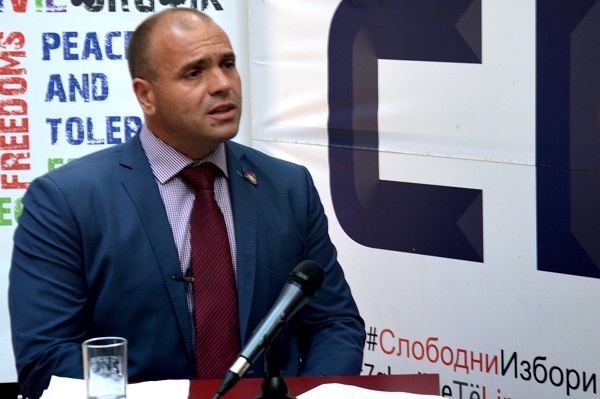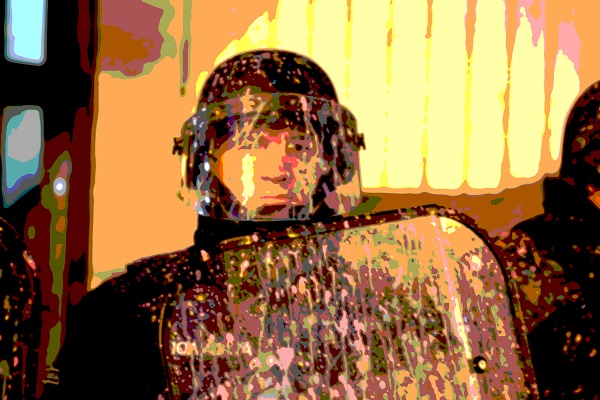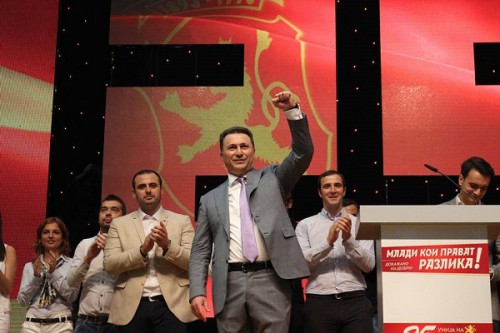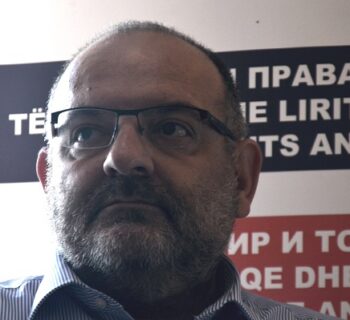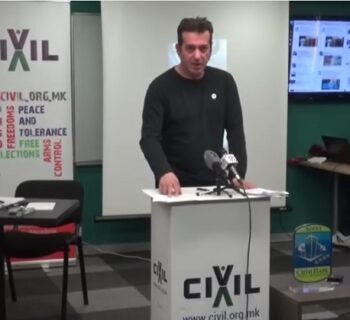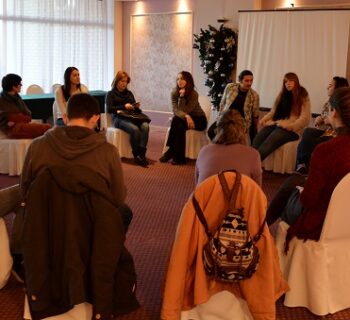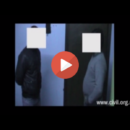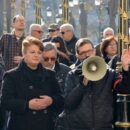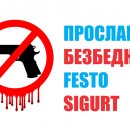Maksim Dimitrievski, President of the SDSM Defense Committee, in an interview for CIVIL Media stated that Macedonia’s security is a “result of our Army and above all our citizens”, emphasizing that there cannot be any security in a country that has “transformed into a country of modern slaves”.
In the interest of the citizens’ security, and not only in the event of natural disasters, we spoke with Dimitrievski on the readiness of the Army of the Republic of Macedonia and of the institutions of the system to handle such crisis situations.
CIVIL Media: How much is Macedonia currently a safe and secure country?
DIMITRIEVSKI: Republic of Macedonia is a safe and secure country due to one simple reason, and that being the composure and understanding of its citizens. We live in turbulent times, faced with all of today’s challenges in terms of security, and it is more than clear that the citizens are much more conscious than the institutions and the people who have received a mandate to manage and lead these institutions. The events of May 9 and 10, in Kumanovo, confirmed this. The institutions were abused by individuals, and many mistakes were made in the area of the security. A militant group infiltrated in Kumanovo, where representatives of security forces were sent as raw meat who faced an open conflict in which there was gunfire and two days of shooting. However, the citizens of Kumanovo showed that they are much more conscious and know what the safety and stability of a country mean, and thanks to them, that safety and stability were well-kept.
The fact is that the institutions of the system are very porous and for one single reason – the Republic of Macedonia is being ruled carelessly for 11 years! There is no essential or strategic planning in the segments of the functionality and functioning of the state apparatus.
CIVIL Media: The current Defense Minister interrupted an interview because of “sensitive” questions regarding the situation in the Army. Until when will Macedonia keep investing only in the police and how do you assess the current situation in the Army?
DIMITRIEVSKI: In Macedonia there has been unseen militarization in the police for 11 years now in continuity. Funds from the budget that were planned in the past, until 2006, used to be over a hundred and twenty million euros annually. Today, we are in a situation where that budget barely reaches eighty to ninety million euros, and at the end of the year, with a budget rebalance, even that is additionally reduced. On the other hand, the Ministry of Interior is militarizing, taking over part of the state defense segment into its own hands. It is done with the sole purpose of having this system that is governed by an irresponsible government led by Nikola Gruevski stay in power, even though it is politicizing the institutions of the system, and using the security segment for keeping that power. Meaning that each government that is undemocratic, uses the police – through the monopoly of physical violence and other types of pressure on the public and public opinion, especially on citizens on the day of the elections.
The interview that Mr. Zoran Jolevski interrupted, just confirms the fact, which we as an opposition have been continuously pointing out for years in that the defense of the country has been brought to the bottommost point. The fact is that we are faced with security risks. And the events with the floods in Skopje showed that our soldiers were exposed and left on the ground to themselves. While serious partner armies like NATO react with serious equipment on the ground, our soldiers were on the field without rubber boots and rubber gloves and without basic working equipment, not to mention heavy machinery and other equipment that is necessary in such situations.
CIVIL Media: The natural disasters showed that a large part of the prevention system does not function properly, as you pointed out yourself. What is missing, according to you?
DIMITRIEVSKI: We cannot prevent natural disasters, regardless of which political party is in power. The citizen has no power over nature, and nature always takes its toll, if you mess with it. Though we can certainly be more prepared. When I say prepared, I primarily refer to educating the citizens, but also to the technical equipment of the institutions that are responsible for reacting in such situations.
All the positive laws in the country, in terms of legislative acts, have been passed in the period 2004 – 2006, and they are still in effect. But, unfortunately, they are not respected. In this case, the Crisis Management Center and the Protection and Rescue Directorate are precisely the two most competent institutions in the country that need to react in such situations. They are responsible according to the law. Those institutions are extremely politicized. The country invests around 8 million euros annually in these two institutions from the budget of Macedonia, citizens’ money…there are over 800 employees in these institutions. But, they are not properly equipped, nor trained to react in such situations.
That is why Prime Minister Emil Dimitriev, from the first day, stooped to a level of asking for aid in sandwiches and other types of food from the friendly countries?! I personally, and on behalf of the opposition, am grateful that all of our friendly countries did not spare themselves. They immediately sent technical assistance to Macedonia. The question is whether we would have been able to deal with this difficult situation if it hadn’t been for them. The army was immediately sent on the ground, which according to the law on crisis management, is the first to be sent on the field if it is requested to do so.
The problem with the floods that contributed to many casualties, and with searches still going on for some who are still missing, primarily was caused due to poor planning. Not only on the ring road, but also on the infrastructure on the ground. The people who are experts on that subject, say that even reforestation is a problem, and we have continuous reforestation throughout Macedonia, but also uncontrolled logging. And not to mention all the institutions that are responsible for monitoring of the meteorological conditions, and so forth.
Look, if there were at least three police patrols and at the same time had closed down the Skopje ring road, today we wouldn’t have been speaking of such a great number of lost lives. Unfortunately, mistakes are made at the basic level. What we are doing as a country is most heavily paid by our citizens, who give us their trust for us to lead them and to decide on their behalf. Specifically, the Crisis Management Center and the Protection and Rescue Directorate are institutions that are directly responsible for managing this crisis. Headquarters should have been formed for coordinating field activities. There was chaos on the field. There wasn’t an institution that had an organized command and that managed the entire process of handling the situation and resolving the problems of the citizens.
I will tell you one piece of information, which Minister Jolevski himself mentioned. As of 2006, when a representative from the lines of SDSM was the head, there is a regulation that is still in force that states that mobile rapid response units shall be formed within three hours. Imagine, Minister Jolevski publically admitted in an interview that the helicopter hadn’t taken off until 5am. I do not want to abuse the moment and discourage the citizens, but I have to say that the country, in terms of its technical readiness and defense and its mobility, is faced with serious challenges, because the system is coordinated everywhere else. The political elite has to awake and there has to be a change of government, if we want to change something seriously, otherwise we will just keep on talking about the flaws and mistakes.

CIVIL Media: Does this mean that the Army of Republic of Macedonia, with the exception of the security sector, is not sufficiently prepared to deal with this part of its scope of work, such as handling natural disasters? What are the key security risks that Macedonia is facing and how are the state security institutions responding upon them?
DIMITRIEVSKI: We have over 8.000 members in the Army and in the Ministry of Defense. The army is a very serious system. It is very difficult to destroy it. It is very difficult to break it, because it primarily depends on the will of the professional who is within it. Despite the fact that the system is continuously being torn apart from the inside, with politicization in the army hierarchy, and especially with party instead of professional promotions. Still, it is very difficult to destroy that system, because we have many serious professionals there who are performing the tasks they receive from their higher-ranking professionals in a very dedicated and consistent manner.
The soldier will perform his task, regardless if he has rubber gloves or not! He does not say I cannot or I do not want to, he always says I understand and performs the tasks. However, the question is at what level is the morale of the soldiers. In particular, one engineering unit has been brought in a situation in which most of the vehicles are not in a good condition and are not maintained regularly. Then the soldier will say to himself – I am serving an army that is not compatible to the standards where I want to be, and that being NATO and the collective security systems. They are left on their own and they have to improvise. That is not a serious approach. The army should not survive, it should always be on the pedestal and be the first to be prepared to face all security and defense challenges at every given moment.
What kind of challenges is Republic of Macedonia facing? The refugee crises showed the kind we are facing. It took thousands and thousands of refugees to cross the territory of Macedonia in order for the country to become aware and to respond institutionally. If you remember, until a year ago, the refugees used to pass the “Aleksandar Veliki” (Alexander the Great) highway with bicycles, which points to the fact that the country was vaguely monitoring the migration process. And here, at the beginning, we were left on our own to deal with this great security challenge. Later, the Army was additionally engaged. The people who were there, professionally performed a great job for the country and for us citizens.
Continuous investment, but substantial investment, in defense is more than necessary. A professional member of the Army cannot be brought in a situation of having just one uniform and being sent to the field and not having the opportunity to change it because there is not another one. And believe me, there are such moments. I am more than sure that our soldiers are prepared to go through everything in performing their tasks. But, the question then arises as to why is it precisely the politicians and the elite that is leading the country that have brought the Army in such a situation.
CIVIL Media: How much is this situation of the Army additionally leading the country at risk? Is it at all leading it at risk?
DIMITRIEVSKI: We, in general, are following the global trends in security. We are in the center of the Balkans. We are surrounded by many countries that are members of NATO. De facto we have entered under the umbrella of NATO. But, the problem is that we as a country have committed ourselves to following the NATO standards. This government that is led by Gruevski, has been continuously generating classic Euroscepticism in public after the debacle in 2008 in Bucharest. It primarily achieves this through the media that is close to them, and later, through certain political representatives who publically speak about it. Today we are facing the fact that Macedonia is not meeting all the standards for a fully entitled NATO membership. Maybe our politicians and government representatives are publically saying that we are fulfilling all standards, but the actual situation is not like that.
Otherwise, our security, which is a result of our Army and primarily of our citizens, is not essentially endangered, because the problems are regional.
CIVIL Media: You mentioned the refugee crisis, an aspect that currently is not very prevalent, but one that Macedonia could come to face again. Is the Government abusing this situation for gaining political points, not only internationally, but also in the country?
DIMITRIEVSKI: The government is using every situation, since this is a classic populist rule of politics, the government is using every opportunity for gaining all political points in the eyes of the ordinary voter. However, in the search for support among ordinary citizens, we are making substantial mistakes that cost the country greatly and are pulling it back. I will say once again, there will come a moment when inevitable changes will occur as a result of the will of the citizens, which will result with political changes in the country. I am convinced that a new political elite will come that will approach issues much more responsibly. We are living in a country created for a group of people in power! Macedonia has become a creation of the will of the individuals who are leading it. In addition to them, we have sixty thousand absolute party loyalists who are enjoying the privileges of power and are living solidly. The rest of us have been brought in a situation to be in the government’s function and to serve them! Macedonia has turned into a country of modern slaves! This is not allowed in the 21 century. It is not allowed in any country in Europe.
To be speaking today of general democratic rights of citizens is inappropriate. The moment has come. There has to be an overall stabilization, primarily in the political sense, in order for the country to move forward, because the citizens are already tired of politics. Citizen and man have been created primarily to generate, produce and achieve results. To feel the results individually, but also collectively.
Biljana Jordanovska
Camera: Аtanas Petrovski
This post is also available in: AlbanianMacedonian
 Македонски
Македонски Shqip
Shqip English
English
